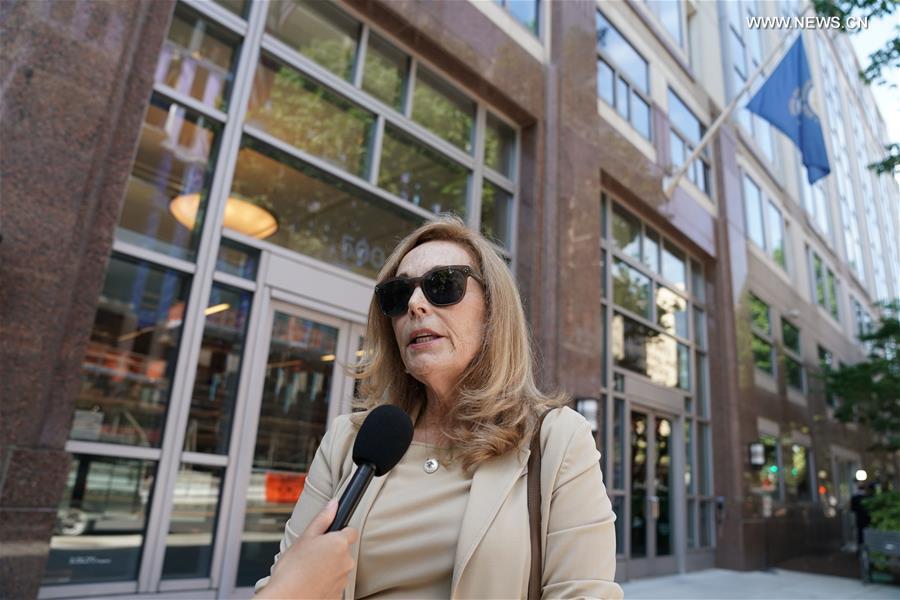US businesses oppose tariff hikes, stress China's irreplaceable role in supply chain
 0 Comment(s)
0 Comment(s) Print
Print E-mail Xinhua, June 19, 2019
E-mail Xinhua, June 19, 2019

U.S. business and industry representatives on Monday voiced their frustration over and opposition to a proposed new round of tariffs on Chinese imports, sharing stories on how Washington's trade protectionism would backfire.
They were attending the first of a series of public hearings, held by the Office of the U.S. Trade Representative (USTR), inside the U.S. International Trade Commission Building, regarding proposed additional tariffs of up to 25 percent on 300 billion U.S. dollars in goods from China.
Speaking to federal trade officials and Xinhua, witnesses made clear that they don't want tariff hikes on Chinese imports critical to their business operations and jobs, and that it is difficult for them to move production out of China or find alternative sources, while warning that U.S. companies, industries, and eventually families and consumers would pay the price.
Different industries, unified voice of opposition
Brent Cleaveland, executive director of the U.S. Fashion Jewelry and Accessories Trade Association, the first witness at Monday's hearing, said that the industries, which moved production to China in the 1980s in order to provide greater value to the domestic market, have relied heavily on Chinese imports, adding that the proposed tariffs would really threaten U.S. businesses and jobs.
The association estimated that tens of thousands of employees of its members would be hurt by the increase of tariffs that would lead to higher costs, decreased margins, and declines in sales.
"There is a real fear that the tariffs would result in employees losing their jobs and American businesses closing their doors," Cleaveland said.
Overall, the new tariffs are designed to target nearly all consumer products, including apparel and shoes, electronic gadgets, TV sets and sporting goods, covering the remaining U.S. trade with China, which has already been hit by several rounds of tariffs despite wide opposition. China has put in place retaliatory measures.
Juvenile products, including car seats, baby gates, and strollers, were also in Washington's latest tariff list but they "should be available to America's families at the lowest possible cost," said Lisa Trofe, managing director of the nation's Juvenile Products Manufacturers Association.
The hearing came less than a week after more than 600 U.S. companies and trade associations, including some of the nation's biggest retailers, sent a letter to the White House, saying that tariffs are taking quite a toll on U.S. families, jobs and the economy.
Kerry Stackpole, CEO and executive director of Plumbing Manufacturers International, told Xinhua on the sidelines of Monday's hearing that previous tariffs have already increased the cost of buying a home in the United States by about 9,000 dollars, adding that every thousand-dollar increase will disqualify about 127,000 families from being able to buy one.
China irreplaceable in supply chain
When asked by the panelists whether they could somehow shift supply chains out of China, many representatives at the hearing didn't refrain from lecturing the officials about the extreme difficulty, and in some cases, impossibility.
"The truth of the matter is we've been trying to get out of China for years, but they just seem to do it better than anybody else," Rick Helfenbein, president and CEO of the American Apparel and Footwear Association, said in response to a question from the hearing's committee.
"There are limited places ... we can go," Helfenbein said, adding that the next possible locations following China -- Vietnam, India, Indonesia and Bangladesh -- are simply not cost-effective.
For Jean Kolloff, CEO and founder of Quinn Apparel + QI Cashmere, it's not an option to move the supply chain anywhere else.
Her designer company only sources out of Inner Mongolia in northwestern China because the Alashan breed of goat, from which premium quality fiber comes from, is indigenous to that region.
But what draws Kolloff to China is not only the specific breed of goat. "Quality is controlled and the best spinners and dyers of cashmere raw material, yarn, are located in that part of the country," she told Xinhua after the testimony.
Nicholas Lardy, a senior fellow at the Peterson Institute for International Economics, told Xinhua recently that "I am prepared to believe that a lot of companies are exploring alternatives to producing elsewhere. But I don't see that there's a big uptick in companies actually departing."
Lardy, who has written several books on the Chinese economy, said that it would probably be "not so smart" for companies to massively move supply chains away from China, because it would be difficult to find a place that could "absorb that big an increase," whether it's logistics or labor supply, or anything else.






Go to Forum >>0 Comment(s)